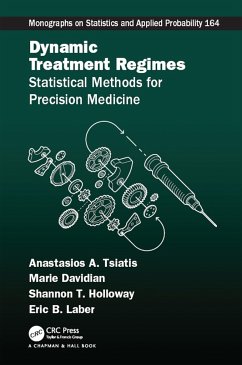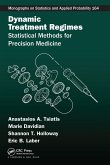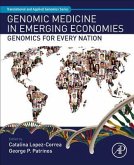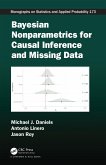Precision medicine seeks to use data to construct principled, i.e., evidence-based, treatment strategies that dictate where, when, and to whom treatment should be applied. This book provides an accessible yet comprehensive introduction to statistical methodology for dynamic treatment regimes.
Hinweis: Dieser Artikel kann nur an eine deutsche Lieferadresse ausgeliefert werden.
Hinweis: Dieser Artikel kann nur an eine deutsche Lieferadresse ausgeliefert werden.
"Biostatisticians, those that are professional as well as masters level and PhD level, will find this book useful. It is written by well-known experts who have incredible track records in this field, both methodologically and in designing and implementing/analyzing SMARTs and observational studies to uncover optimal dynamic treatment regimes. The text is rigorous in its statistical definitions and theorems. It is a comprehensive text on the area of dynamic treatment regimes and SMART design. Both those familiar with this area and those new to the area will learn something. They offer some interesting uses of the SMART design (e.g., dose finding and extending beyond 2 stages), that you cannot find in current manuscripts."
~Kelley Kidwell, University of Michigan
"The book will serve as an excellent reference and textbook. I expect I will use the book in my own class, once it is available. Besides being a comprehensive treatment of dynamic treatment regimes, the revision/re-introduction to causal inference, potential outcomes, M-estimators, propensity scores, and related issues is extremely useful."
~Daniel Lizotte, The University of Western Ontario
"Statisticians/biostatisticians directly involved in planning SMARTs would likely find this material useful, as they would have to adapt or extend these methods to particular trials being planned. Also, academic statisticians aiming to get into this field of methodological research would likely find the material as a useful summary of the already extensive literature; however, as the field is fast-moving, this material only serves as a starting point. The authors are not providing a cookbook-style guide to planning a variety of different kind of SMARTs, they provide examples, and enough theoretical background rigorously presented to get started in the area."
~Olli Saarela, University of Toronto
"(Chapters 2-4) are very nice indeed: well written, well structured, informative and interesting. Congratulations to the authors... I went to the website, which is beautiful. The authors have put lots of effort into this.
~Robin Henderson, Newcastle University
~Kelley Kidwell, University of Michigan
"The book will serve as an excellent reference and textbook. I expect I will use the book in my own class, once it is available. Besides being a comprehensive treatment of dynamic treatment regimes, the revision/re-introduction to causal inference, potential outcomes, M-estimators, propensity scores, and related issues is extremely useful."
~Daniel Lizotte, The University of Western Ontario
"Statisticians/biostatisticians directly involved in planning SMARTs would likely find this material useful, as they would have to adapt or extend these methods to particular trials being planned. Also, academic statisticians aiming to get into this field of methodological research would likely find the material as a useful summary of the already extensive literature; however, as the field is fast-moving, this material only serves as a starting point. The authors are not providing a cookbook-style guide to planning a variety of different kind of SMARTs, they provide examples, and enough theoretical background rigorously presented to get started in the area."
~Olli Saarela, University of Toronto
"(Chapters 2-4) are very nice indeed: well written, well structured, informative and interesting. Congratulations to the authors... I went to the website, which is beautiful. The authors have put lots of effort into this.
~Robin Henderson, Newcastle University








